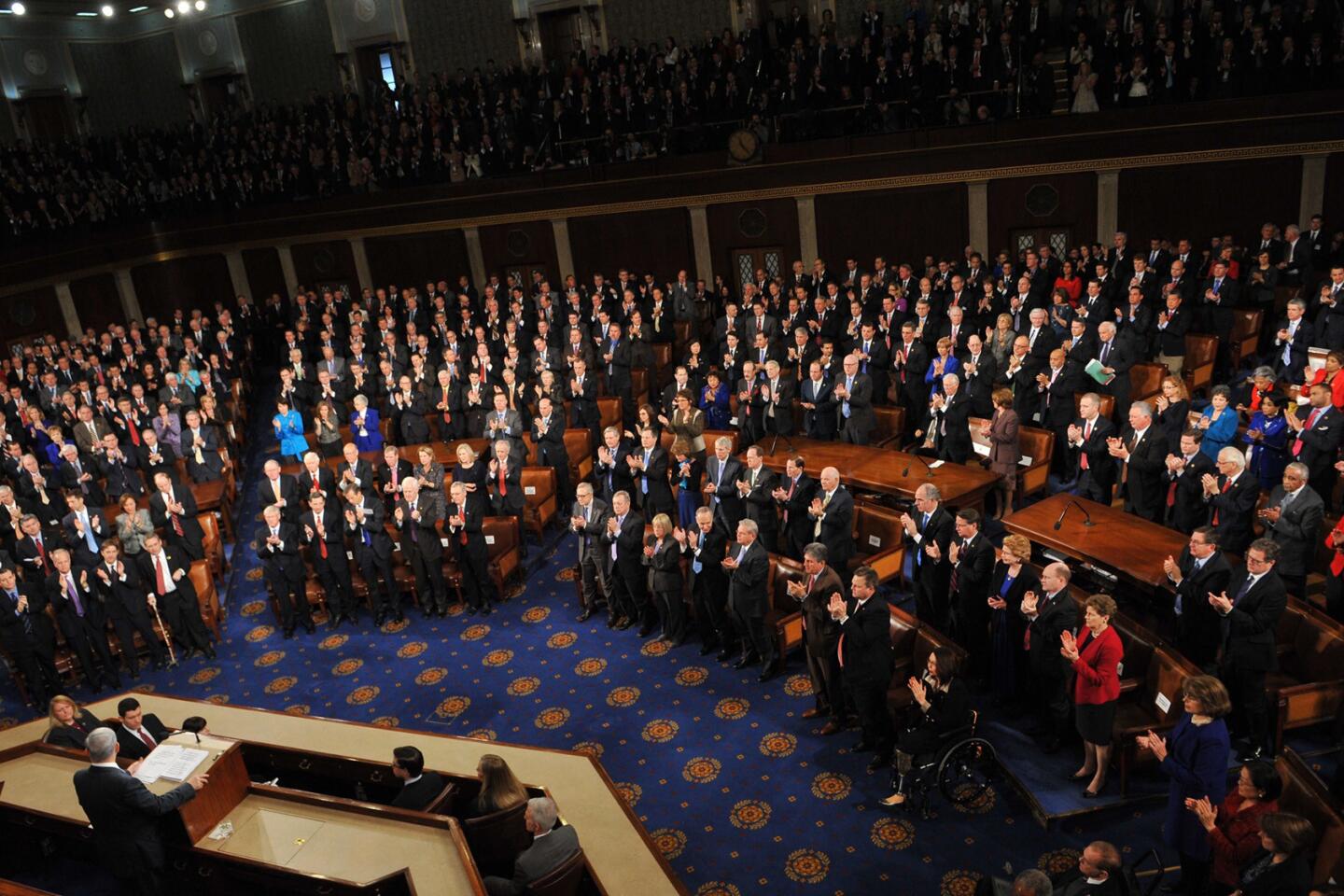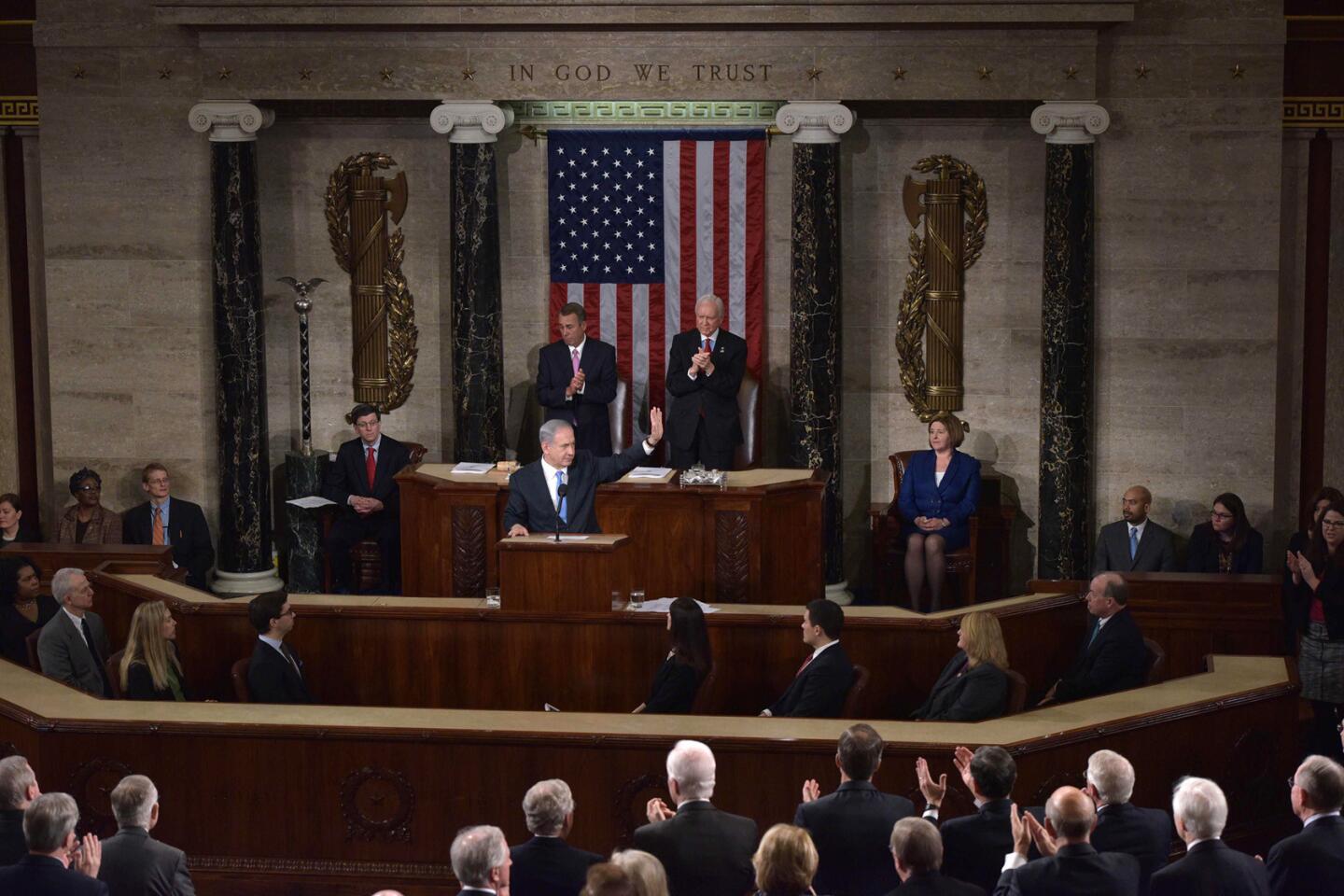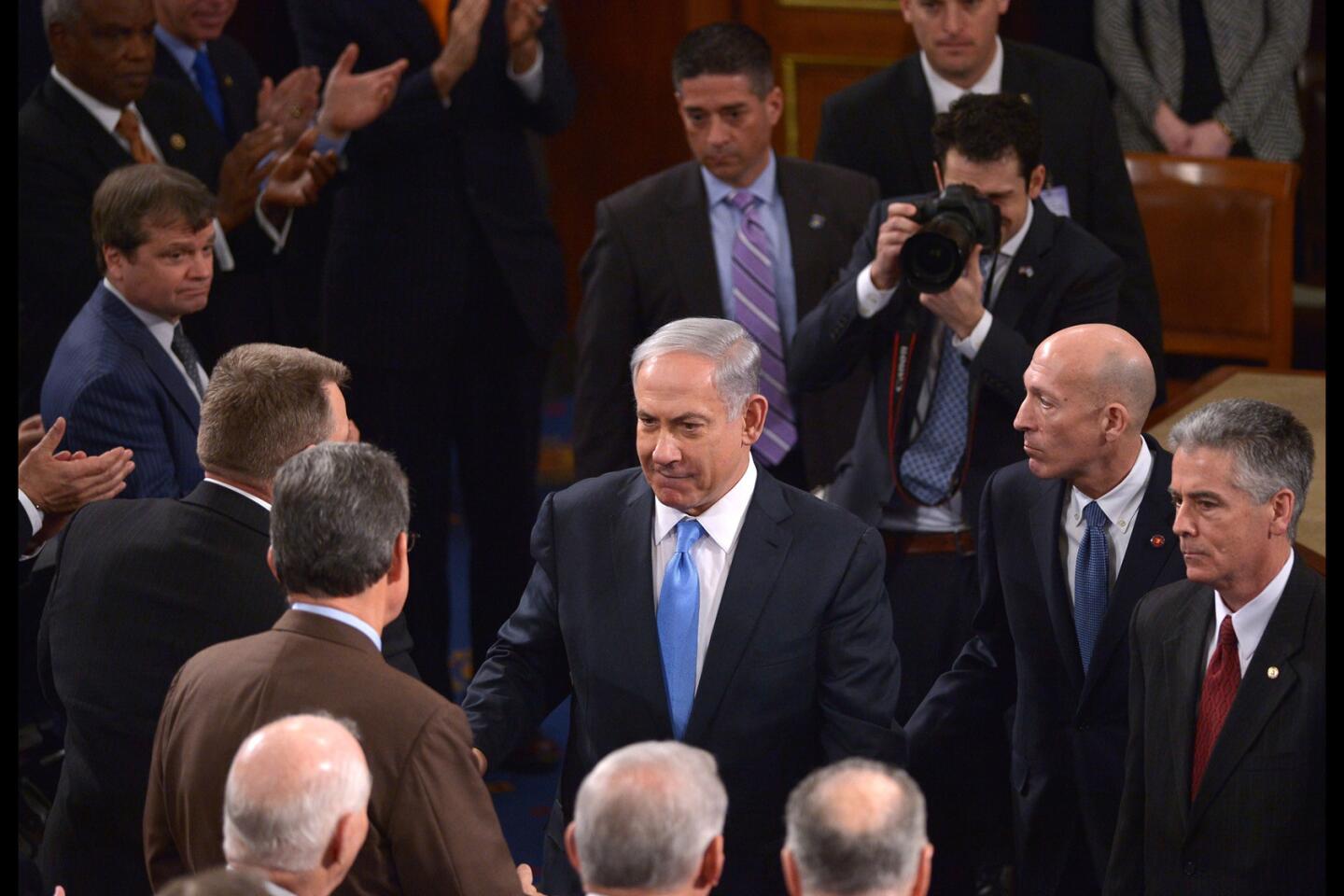Netanyahu warns against Iran nuclear deal but offers no ‘viable’ options
Reporting from Washington — The scene was as unprecedented as the topic was grave.
A foreign leader, Israeli Prime Minister Benjamin Netanyahu, stood at the rostrum of the House of Representatives, addressing a joint meeting of Congress, directly challenging the president’s top foreign policy goal as unwise and dangerous.
“This is a bad deal. It’s a very bad deal. We’re better off without it,” Netanyahu declared Tuesday, denouncing President Obama’s negotiations with Iran over its nuclear program.
As Republican members of Congress loudly applauded and many Democrats glared in anger, Netanyahu laid out the case for opposition to the still-developing deal, which the United States and five other nations have struggled to hammer out with Tehran since 2013.
The speech, which even opponents called a powerful piece of oratory, marked a moment at which the political battle over a nuclear deal with Iran became fully engaged, even though no agreement is yet certain. Obama and his aides continue to say that odds of reaching one are no better than 50-50.
If they succeed, administration officials do not plan to submit an agreement to Congress for a vote — it will not be a treaty requiring ratification. But they acknowledge that legislation would still be needed to carry out its key terms, which would include gradual easing of sanctions that have crippled Iran’s economy.
A congressional test could come soon. Senate Majority Leader Mitch McConnell (R-Ky.) said after the speech that he would try to bring a bill to the floor that could trigger a congressional vote on any agreement. Opponents of the negotiations also hope to win approval this spring of additional sanctions against Iran, an effort Obama has warned against, cautioning that it could derail the talks.
As detailed by Netanyahu, the case against the prospective deal is that it would leave too much of Iran’s nuclear infrastructure intact and allow Tehran to escape most restrictions altogether after only 10 years.
“A decade may seem like a long time in political life, but it’s the blink of an eye in the life of a nation. It’s a blink of an eye in the life of our children,” Netanyahu said. Iran, he said, was an aggressive and dangerous sponsor of terrorism and would remain so a decade hence.
The deal, he said, “doesn’t block Iran’s path to the bomb; it paves Iran’s path to the bomb.”
His argument had three parts:
First, Iran’s government cannot be regarded as a normal power open to negotiation and compromise, he said. Instead, he insisted, Iran remains a revolutionary regime committed to overthrowing the established order, one he likened to Germany under the Nazis.
“The ideology of Iran’s revolutionary regime is deeply rooted in militant Islam, and that’s why this regime will always be an enemy of America” as well as a dire threat to Israel, he said.
Second, because the regime can never be expected to moderate, a deal that expires, even after a decade, will not provide security to Israel or Arab countries that see Iran as a threat, he said. The result will be a rapid proliferation of nuclear dangers as other countries in the region seek to offset a potential Iranian bomb.
Finally, he said, the alternative to the current negotiations “is not war,” but a “better deal” that the U.S. could achieve if it is willing to “call their bluff.”
“They’ll be back,” Netanyahu said, referring to the Iranians, “because they need the deal a lot more than you do.”
Administration officials and their allies seized on that last point as the weakest element of Netanyahu’s case.
“The prime minister didn’t offer any viable alternatives” to the current negotiations, Obama said in brief remarks to reporters a few hours after the speech, which he said he did not watch but had read in transcript.
“The alternative that the prime minister offers is no deal, in which case, Iran will immediately begin once again pursuing its nuclear program, accelerate its nuclear program, without us having any insight into what they’re doing and without constraint,” Obama said.
Netanyahu, he noted, had made similar dire predictions about the interim agreement that the U.S. and its negotiating partners reached with Iran in November 2013. But even many Israeli officials now “have to acknowledge that, in fact, it has kept Iran from further pursuing its nuclear program,” Obama said.
Rep. Adam B. Schiff of Burbank, the senior Democrat on the House Intelligence Committee and a moderate within the party, also criticized Netanyahu for pointing out the risks of a deal, but not those of refusing one.
“We must consider the consequences of a failure to reach an agreement and whether there is a plausible alternative to military action,” he said. “This was a subject on which I would have liked to have heard much more from the prime minister.”
Sen. Dianne Feinstein (D-Calif.) made a similar point.
“What he didn’t say was what would happen if there was no deal,” Feinstein said in a CNN interview. “He didn’t make a suggestion as to what Israel would find agreeable. He simply said, there’s nothing that we agree with here.”
The speech had been controversial long before it took place.
House Speaker John A. Boehner (R-Ohio) had negotiated the appearance with Israeli officials without informing the White House first. Many Democrats saw that as a direct slap at the president, and several dozen, including eight senators and about a quarter of the House Democrats, skipped the speech, particularly members of the Congressional Black Caucus.
Many others attended reluctantly, remaining seated as Republicans rose to cheer Netanyahu’s jabs.
The event took on many of the trappings of a State of the Union speech. Boehner’s wife sat in the gallery with former Speaker Newt Gingrich of Georgia and Sheldon Adelson, the billionaire Las Vegas casino owner who is a top financial backer of both the GOP and Netanyahu. Across the chamber, where the first lady and her guests sat when Obama spoke, Netanyahu’s wife, Sara, sat with Holocaust survivor Elie Wiesel.
Afterward, Boehner called the address “a speech the American people needed to hear.”
Although Netanyahu said he regretted that his appearance had been interpreted as political and thanked Obama for his help to Israel, many Democrats were unmollified.
Rep. John Lewis (D-Ga.) called the speech “an affront to the president of the United States.”
But some Democrats joined in the GOP ovations.
When Netanyahu denounced the “bad deal,” House Minority Leader Nancy Pelosi (D-San Francisco) visibly threw up her hands in dismay. Two rows in front of her, Democratic Sens. Charles E. Schumer of New York and Robert Menendez of New Jersey stood and applauded.
When Netanyahu concluded his remarks, McConnell pumped his fists in the air in support. Pelosi quickly headed to the rear of the chamber to leave.
In a statement afterward, Pelosi said the U.S. and Israel stand united in preventing Iran from gaining a nuclear weapon and that Netanyahu’s appearance had risked politicizing the ties between the two countries.
“That is why, as one who values the U.S.-Israel relationship, and loves Israel, I was near tears throughout the prime minister’s speech,” she said, “saddened by the insult to the intelligence of the United States” for negotiating with Tehran and “by the condescension toward our knowledge of the threat posed by Iran and our broader commitment to preventing nuclear proliferation.”
Back home, where the speech occurred just in time for nightly newscasts and where the prime minister faces a potentially close election in two weeks, reaction was similarly polarized.
Members of Netanyahu’s Likud Party praised him.
His chief opponent, Isaac Herzog, told a rally at a farming community in southern Israel that “undoubtedly, Netanyahu knows how to deliver a speech.”
But the circumstances surrounding the address had “caused grave damage to Israeli relations with the U.S.,” he said, adding that it “will not change the administration’s position, and will only deepen the rift with our most important ally.”
Times staff writers Paul Richter and Lisa Mascaro in Washington and Alexandra Zavis in Los Angeles and special correspondent Batsheva Sobelman in Jerusalem contributed to this report.
Follow @mikememoli and @DavidLauter for more news out of Washington
More to Read
Sign up for Essential California
The most important California stories and recommendations in your inbox every morning.
You may occasionally receive promotional content from the Los Angeles Times.
















